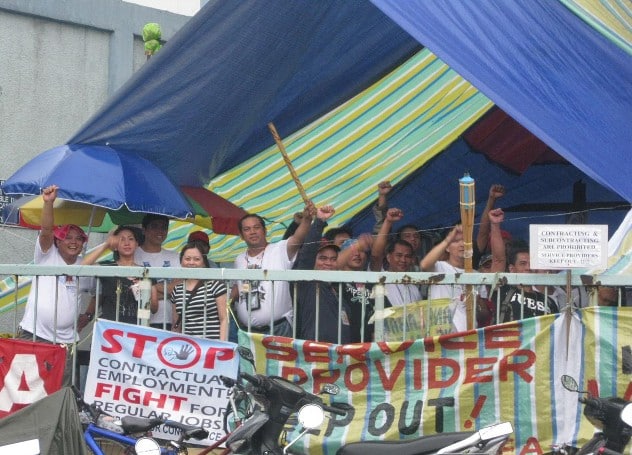In my last posting on #OWS, I related a series of conversations I’d had with global trade union activists on their perceptions of #OccupyWallSt. After the article appeared, several global labor activists contacted me with follow-up and feedback. Steve Faulkner, an International Officer at the South African Municipal Workers Union (SAMWU), wrote to say that the success of the movement in Zuccotti Park firmly reminded trade unions in South Africa that they couldn’t be just “glorified publicity campaigns,” but that the trade union movement actually needed to be “providing space for action and discussion for the posing of important questions while people are taking action.” Faulkner continued:
The issue of occupying workplaces is very likely to be posed as manufacturing concerns continue to downsize, and often in geographical areas which are already chronically impoverished. It’s already happened in a limited way. There have been partial occupations of municipal premises . . . and this too will be increasingly posed as a useful tactic in the light of service delivery campaigns and against privatisation and corruption. I sense a growing interest in occupations as a result of Wall Street.
On this side of the Atlantic, metalworkers in Uruguay have occupied at least 40 factories, according to a report issued by the International Metalworkers Federation. According to a National Metalworkers’ Union (UNTMRA) spokesperson, employers in Uruguay have “increased repression of the workforce, temporarily placing some workers on unemployment pay, threatening to dismiss others and generally acting in a provocative way in order to change the focus of the dispute away from our list of demands.”
 |
And the word itself, “occupy” (in its many translations), seems to be trending throughout the global labor movement. “Aviation workers who were sacked following the outsourcing of their jobs earlier this month carried out a Wall Street-inspired protest in the Philippines last week,” reports the International Transport Workers Federation. The workers declared on 15 October that “their protest camp at Manila international airport, set up in the aftermath of the workers’ dismissal from Philippine Airlines, was part of the ‘Occupy’ movement.”
Workers elsewhere are likewise employing age-old variations of the tactic. Earlier this week, Petrobras Workers began a slowdown at platforms and refineries in Brazil. Civil servants in Greece are planning a new series of strike actions for next week. And even though arrests of workers and activists seems to continue unabated, including a number of arrests on Friday at the Victoria Trades Hall in Melbourne, support of the #OccupyWallSt and #OccupyTogether movement, and its tactics, continues to increase.
But as Mike Elk reports in his recent post at the “Working” blog at In These Times, bold action isn’t always the best initial response in every workplace campaign. Citing a series of recent examples from the States, Elk argues for “carefully escalating labor campaigns.” In this moment of fervor over the occupations at Zuccotti Park, heeding the suggestions of both Elk and Fauklner seems wise. And the trade union’s ability to develop just these kinds of spaces for both dialogue and non-violent action — be it at the general assemblies at #OWS or transformations of that tactic in the local, national, and global trade union movements themselves — is yet another benefit for global workers that might emerge from the current movement occupying a park in lower Manhattan.
Mark Nowak is the author of Coal Mountain Elementary (Coffee House Press, 2009) and Shut Up Shut Down (Coffee House Press, 2004). Read his blog Coal Mountain at <coalmountain.wordpress.com>.
var idcomments_acct = ‘c90a61ed51fd7b64001f1361a7a71191’;
var idcomments_post_id;
var idcomments_post_url;
